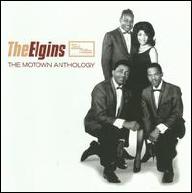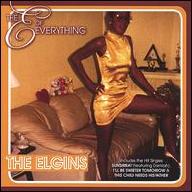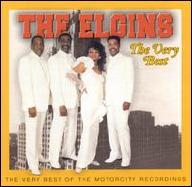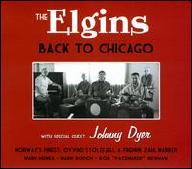The California Elgins were comprised of Jimmy Smith, William Devase, Darryl Cappie Lewis, Kenny Sinclair, and Oscar McDonald, who joined forces in 1959. The various members brought some solid musical experience with them. Lewis, Devase, and Sinclair had all attended Centennial High School in Compton, CA. Lewis and Sinclair were both original members of the Six-Teens, fronted by Lewis' cousin Trudy Williams, who was 12 years old when she joined the group. The Six-Teens scored a big hit in 1956 with A Casual Look and had waxed several other follow-up platters for Flip Records. Devase joined Sinclair in 1958 as part of the Passions group, who recorded My Aching Heart for Era (reissued on Capitol). Joining William Devase and Kenny Sinclair in the Passions were Sinclair's brother Earl, Sammy Hardy, and Harold Garcia. The following year, 1959, Earl left the group, and with a name change to the Colognes, recorded A River Flows, the second record to be released for Lummy Fowlers' new Lummtone label.
Oscar McDonald and Jimmy Smith had gone to high school together in Beaumont, TX. Jimmy Smith remembers participating in several talent contests in Texas, and finishing as runner-up to Johnny Nash, of I Can See Clearly Now fame. Following high school in 1957, Smith moved to California to continue his education, and his musical pursuits. In 1959, backed by the female group the Lockettes, he recorded I Cry and Cry Every Night backed with Night Time Is the Right Time for Flip Records. About the same time, Smith also replaced Kenny Sinclair in the Six-Teens and can be heard on their last Flip recordings in 1960. Unable to match their initial A Casual Look success, the Six-Teens finally parted ways in 1960. Darryl Lewis was not quite ready to call it quits on singing, and decided to put together another group. He reunited with Kenny Sinclair and William Devase, added his brother Carl Lewis, and brought Jimmy Smith in to handle the lead vocal chores. The quintet was known as the Elements and recorded Lonely Hearts Club b/w Bad Man for the Titan label in 1960. They also recorded a tune entitled My Illness, but this was to go unreleased at the time. Not long after recording these sides, Carl Lewis left the group in order to spend more time in search of success as an actor. To fill his spot, Jimmy Smith turned to his former high school friend, Oscar McDonald who, like Smith, had also come to California following high school in Texas. With McDonald now added to the group, the Elgins were born. Along with a change in personnel and group name, came a label change to Flip, a return to familiar shores.
The Elgins recording on Flip of Uncle Sam's Man b/w Casey Cop was released in December of 1960 and established the group on the west coast. With Uncle Sam's Man, Lewis had decided to go back to the "love and the military" theme that had worked well for the Six-Teens on A Casual Look. The success of Uncle Sam's Man certainly caught the attention of George Brown at Titan Records. Remembering that he still had an unreleased recording by the group (they had recorded as the Elements) still in the vaults, Brown decided to capitalize on their recent success and issued My Illness backed with Extra Extra in 1961 under the name the Elgins rather than the Elements. Although it was a great tune, the title, My Illness, was not exactly the catchiest of phrases. Realizing this, Brown reissued the record in 1962 with the My Illness title changed to Heartaches, Heartbreak, a somewhat less somber name for the tune. The new name came from part of a refrain in the song.
1962 saw yet another label change for the group, this time to the Lummtone label. Their first release, Lummtone 109 was A Winner Never Quits backed with Finally. Barbara Lewis, (not related to Darryl) who had replaced Devase in the group at the time, is heard on Finally behind the lead of Darryl Lewis. Subsequent pressings of Lummtone 109 replaced Finally with Johnny I'm Sorry. Issued again as Lummtone 110, Johnny I'm Sorry took on new life, this time backed with You Got Your Magnet on Me Baby. For the Elgins' next outing on Lummtone, Devase was back in the group to record I Left My Heart in the Big City. The flipside was Finally, which was resurrected from the previous release. The record was later released on the Lantam label as Big City by the Daniels. Lummy Fowler scored again with I Left My Heart in the Big City when the song was covered several years later by Jermaine Jackson. The Elgins' final recording for Lummtone was in 1963, Your Lovely Ways b/w Finding a Sweetheart.
In 1965, the Elgins released what would be their last record together, a more pop-sounding record, Street Scene, backed with You Found Yourself Another Fool for the Valiant label. The record didn't attract too much attention at the time, but is now highly valued in Northern Soul circles. In the same year, Lummy Fowler took some previously unreleased Elgins tracks, Woman And Child and The Granny Dress, and issued them as by the Arrivals on Lummtone 118. Like the Valiant release, this quickly played itself out only to become a Northern Soul collectable.
Sinclair, Devase, and McDonald recorded again between 1968-1970 as the Bagdads, putting out three singles for the Double Shot label, most notable of which was Bring Back Those Doo-Wops.
The Elgins reunited in the mid-'90s with all the original members, and have been performing, to receptive audiences on both the East and West coasts. ~ Jim Dunn & Nikki Gustafson, Rovi
















